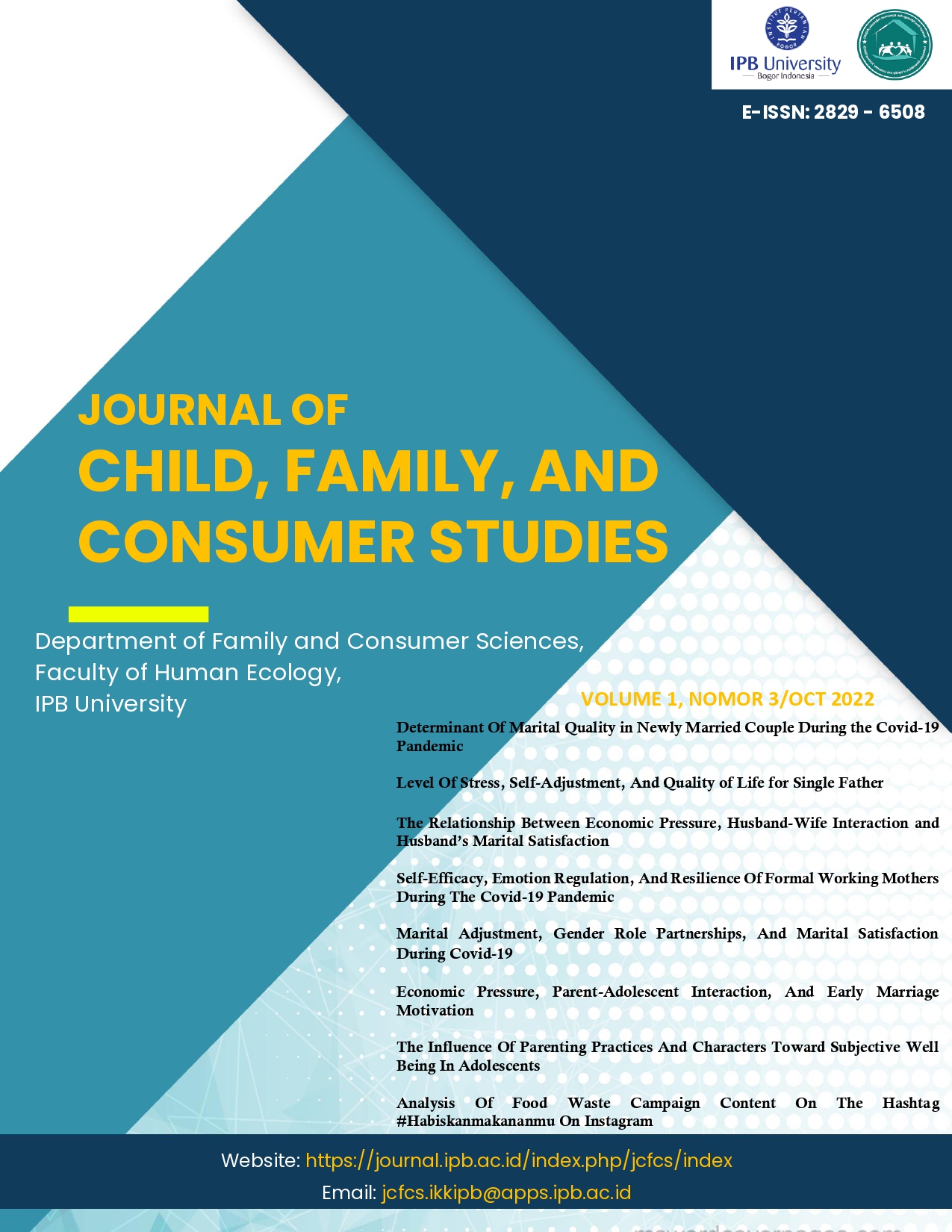THE INFLUENCE OF PARENTING PRACTICES AND CHARACTERS TOWARD SUBJECTIVE WELL-BEING IN ADOLESCENTS
Abstract
Subjective well-being is considered one of the scientific measures to represent one's happiness and quality of life. This research aims to analyze the influences of parenting practices and characters toward subjective well-being in adolescents. This research used the explanatory method and was conducted in Bekasi, which was chosen based on a purposive approach. The respondents were 213 adolescents in the 11th grade of senior/vocational high school. The primary data was self-administered and collected through questionnaires. The collected data included adolescent characteristics (age and gender), family characteristics (parents' age, education, work status, and family size), parenting practices, characters, and subjective well-being. The data obtained were then processed and analyzed descriptively and inferentially using Microsoft Excel and SPSS 26. The results show that the parenting practices index and subjective well-being index were in a low category, while the character index was in the moderate category. The correlation test found that female adolescents tend to receive better parenting practices. Furthermore, significant correlations were also found among parenting practices, characters, and subjective well-being. This regression test found that parenting practices from the parents and adolescents’ characters significantly influence subjective well-being in adolescents.
References
Cunsolo, S. (2017). Subjective well-being during adolescence: a literature review on key factors relating to adolescent’s subjective well-being and education outcomes. Studi sulla formazione, 20(1), 81-94.
[CPMH] Center for Public Mental Health Fakultas Psikologi Universitas Gadjah Mada. (2020). Urgensi peningkatan kesehatan mental di masyarakat. [diakses 2022 Agu 30]. https://cpmh.psikologi.ugm.ac.id/2020/07/24/urgensi-peningkatan-kesehatan-mental-di-masyarakat/
Diener, E. (1984). Subjective well-being. Psychological Bulletin, 95(3), 542–575.
Diener, E. (1985). The satisfaction with life scale. Journal of Personality Assessment, 49(1), 71–75.
Diener, E., Wirtz, D., Biswas-Diener, R., Tov, W., Kim-Prieto, C., Choi, D. W., Oishi, S. (2009). New measures of well-being: flourishing and positive and negative feelings. Assessing Well-Being: The Collected Works of Ed Diener (pp. 247-266). New York, US: Springer.
Diener E. (2020). Happiness: the science of subjective well-being. In R. Biswas-Diener & E. Diener (Eds), Noba textbook series: Psychology. Champaign, IL: DEF publishers. Diambil dari http://noba.to/qnw7g32t
Fatimah, R., Sunarti, E., & Hastuti, D. (2020). Tekanan Ekonomi, Interaksi Orang Tua-Remaja, dan Perkembangan Sosial Emosi Remaja. Jurnal Ilmu Keluarga & Konsumen, 13(2), 137-150. https://doi.org/10.24156/jikk.2020.13.2.137
Gillham, J., Adams-Deutsch, Z., Werner, J., Reivich, K., Coulter-Heindl, V., Linkins, M., ... & Seligman, M. E. (2011). Character strengths predict subjective well-being during adolescence. The Journal of Positive Psychology, 6(1), 31-44.
Hastuti, D. (2015). Pengasuhan: teori, prinsip, dan aplikasinya di Indonesia. Bogor, ID: IPB.
[Kemenkes RI] Kementerian Kesehatan Republik Indonesia. 2019. Situasi Kesehatan Jiwa di Indonesia. Jakarta (ID): Pusat Data dan Informasi Kemenkes RI.
[KPPA RI] Kementerian Pemberdayaan Perempuan dan Perlindungan Anak Republik Indonesia. 2016. Indeks Komposit Kesejahteraan Anak. Jakarta (ID): Deputi Bidang Perlindungan Anak.
Li, H., Yang, R.D., Wang, X., Ni, S., Xu, J. (2017). The effect of hope and parental cultural maintenance on the relationship between family functioning and identity Integration among Chinese migrant adolescents. [in Chinese]. Psychological Development and Education, 33(4), 417–424.
Mikkelsen, H. T., Småstuen, M. C., Haraldstad, K., Helseth, S., Skarstein, S., & Rohde, G. (2022). Changes in health-related quality of life in adolescents and the impact of gender and selected variables: a two-year longitudinal study. Health and quality of life outcomes, 20(1), 1-11. https://doi.org/10.1186/s12955-022-02035-4.
Novianti, D. S., Alfiasari. (2017). Kepuasan hidup mahasiswa tingkat pertama: kaitannya dengan karakter mahasiswa dan gaya pengasuhan orang oua. Jurnal Ilmu Keluarga & Konsumen, 10(1), 13-23.
Palomar-Lever, J., & Victorio-Estrada, A. (2014). Determinants of subjective well-being in adolescent children of recipients of the oportunidades human development program in Mexico. Social Indicators Research, 118(1), 103-124. Doi: 10.1007/s11205-013-0407-7.
Papalia, D. E., Olds, S. W., Feldman, R.D. (2009). Human development: Perkembangan manusia. Jakarta, ID: Salemba Humanika.
Proctor, C., Maltby, J., Linley, P. A. (2011). Strengths use as a predictor of well-being and health-related quality of life. Journal of Happiness Studies, 12(1), 153–169.
Qiu, C., Li, R., Luo, H., Li, S., & Nie, Y. (2022). Parent-child relationship and smartphone addiction among Chinese adolescents: A longitudinal moderated mediation model. Addictive Behaviors, 130, 107304. https://doi.org/10.1016/j.addbeh.2022.107304
Steele, E. H., & McKinney, C. (2019). Emerging adult psychological problems and parenting style: Moderation by parent-child relationship quality. Personality and individual differences, 146, 201-208. https://doi.org/10.1016/j.paid.2018.04.048
Wijayanti, R., Sunarti, E., & Krisnatuti, D. (2020). Peran dukungan sosial dan interaksi ibu-anak dalam meningkatkan kesejahteraan subjektif remaja pada keluarga orang tua bekerja. Jurnal Ilmu Keluarga & Konsumen, 13(2), 125-136. https://doi.org/10.24156/jikk.2020.13.2.125
Xuan, X., Chen, F., Yuan, C., Zhang, X., Luo, Y., Xue, Y., & Wang, Y. (2018). The relationship between parental conflict and preschool children's behavior problems: A moderated mediation model of parenting stress and child emotionality. Children and Youth Services Review, 95, 209-216. https://doi.org/10.1016/j.childyouth.2018.10.021










